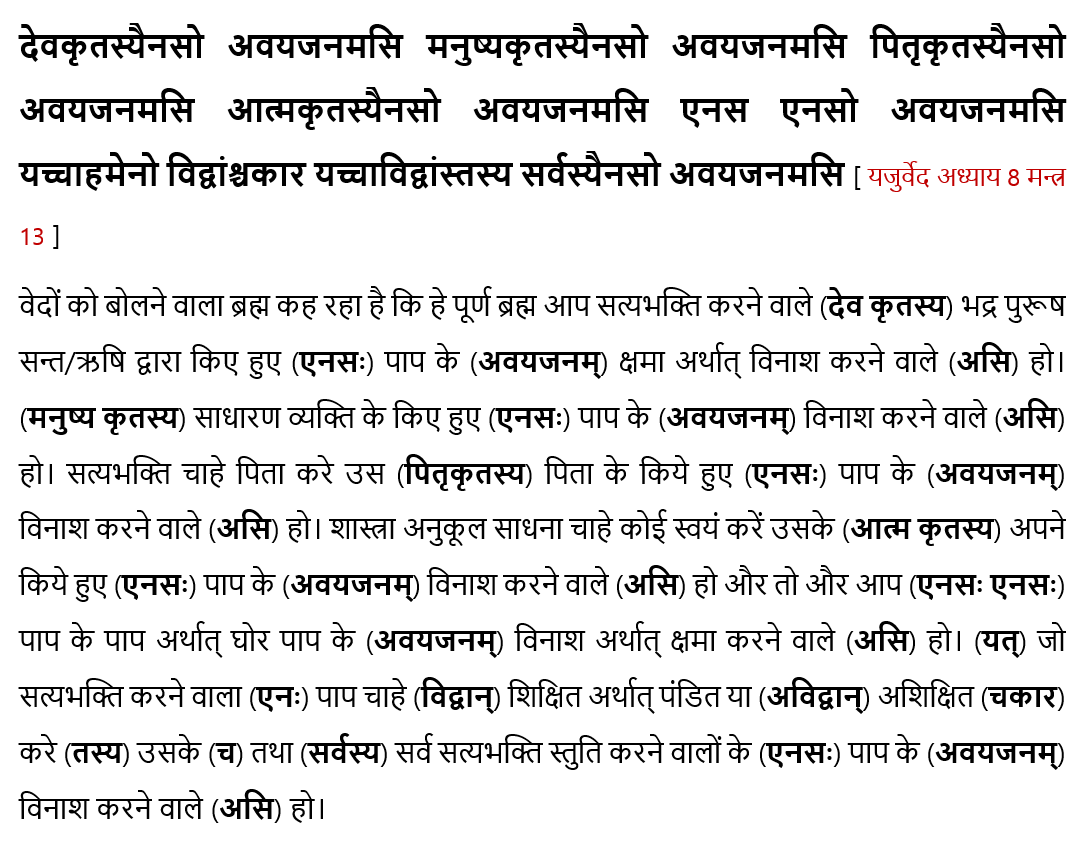Yajurveda Chapter 8, Mantra 13
 Minutes to read.
Minutes to read.
Yajurveda Chapter 8, Mantra 13 - Supreme God can forgive the sins of his devotee (if He wants)
देवकृतस्यैनसोऽवयजनमसि मनुष्यकृतस्यैनसोऽवयजनमसि पितृकृतस्यैनसोऽवयजनमसि आत्मकृतस्यैनसोऽवयजनमसि एनस एनसोऽवयजनमसि। यच्चाहमेनो विद्वांश्चकार यच्चाविद्वास्तस्य सर्वस्यैनसोऽवयजनमसि॥
Devakritasya enasah avayajanam asi manushyakritasya enasah avayajanam asi pitukritasya enasah avayajanam asi atmakritasya enasah avayajanam asi enasah enasah avayajanam asi yat cha aham enah vidvan chakara yat cha avidvan tasya sarvasya enasah avayajanam asi
Translation
The Brahm (speaker of the Vedas) is saying:
O Purna Brahm, You are the destroyer (i.e. forgiver) (avayajanam) of the sin (enasah) committed by the righteous saint or rishi engaged in true devotion (devakritasya).
You are the destroyer (avayajanam) of the sin (enasah) committed by an ordinary human being (manushyakritasya).
If a father performs true devotion, You are the destroyer (avayajanam) of the sin (enasah) committed by that father (pitrikritasya).
If someone performs scripture-based worship himself, You are the destroyer (avayajanam) of the sin (enasah) he committed (atmakritasya).
In fact, You even forgive and destroy the gravest of sins — the sins of sins (enasah enasah), being the destroyer (avayajanam) of those too.
Whether a person committing sin (enah) is (vidvan) (educated or pandit) or (avidvan) (uneducated), if they engage in true devotion, You are the destroyer (avayajanam) of all their sins (sarvasya enasah).
Explanation:
This verse beautifully emphasizes the merciful nature of Purna Brahm (Supreme God). Key ideas:
- Purna Brahm forgives all kinds of sins, whether committed by saints, ordinary people, fathers, or even oneself.
- He is not bound by the qualifications of the devotee — even if one is uneducated (avidvan), He forgives.
- The verse uses repetition of [enasah avayajanam asi], stressing that God destroys even the gravest of sins.
- True devotion (satya bhakti) is the only qualification. If a person performs devotion according to scriptures, Supreme God forgives all sins regardless of who committed them.
Yajurveda Chapter 8, Mantra 13
